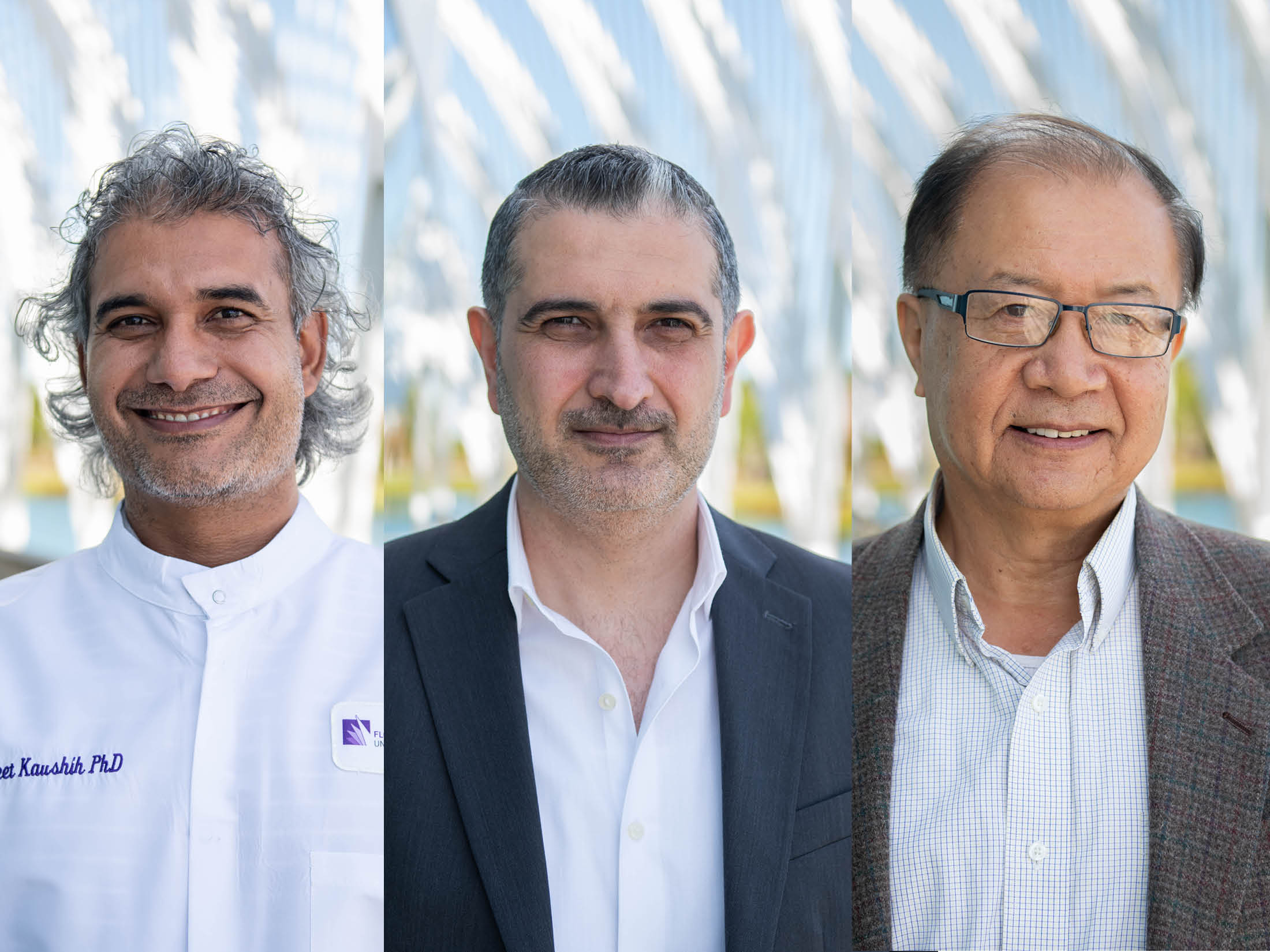
Dr. Ajeet Kaushik (left), Dr. Hisham Mahmood, and Dr. Patrick Zhang were named to a global list of top scientists. The Florida Polytechnic University professors gained recognition for their success in publishing research papers that are widely cited in academia.
With research interests in nanomedicine, energy systems, and rare earth element recovery, three Florida Polytechnic University professors have been named to the prestigious global list of top scientists compiled annually by Stanford University.
Dr. Ajeet Kaushik, assistant professor of environmental engineering; Dr. Hisham Mahmood, assistant professor of electrical engineering; and Dr. Patrick Zhang, director of research mining and beneficiation at the University’s Florida Industrial and Phosphate Research Institute, were listed among the top 2% of the world’s scientists.
Stanford University researchers compiled the list based on the number of articles published by the researchers and the citations the papers received. The findings were shared in Elsevier, which publishes some of the world’s most eminent journals. Dr. Muhammad Rashid, a professor of electrical and computer engineering at Florida Poly, was named to last year’s list.
“We are proud of these faculty members’ outstanding achievements and are very pleased to see their inclusion among the world’s top scientists,” said Dr. Terry Parker, the University’s provost. “The cutting-edge research they are doing is helping to advance science in multiple fields and create solutions that are relevant to our world today.”
Kaushik’s research explores smart and intelligent nanomaterials for use in biosensing applications such as COVID-19 diagnostics, He is also working on using high-performance nanoparticles for developing nanomedicine and targeted drug delivery for the treatment of brain diseases and disorders such as Alzheimer’s and Parkinson’s.
“If your research has an objective to solve an existing problem, you feel motivation automatically,” said Kaushik, who recently accepted editorial board positions with several top ranked international journals such as Biosensors and Bioelectronics-X. “This recognition is a great feeling. I want to make my mentors and my institution proud, and I want to enhance the education and opportunities available to our students.”
Kaushik said he is now beginning to focus on making different nanomaterials for environmental monitoring as well. His goal is to detect pollutant gases and treat water by trapping or killing contaminants.
“I know this kind of recognition comes with responsibility,” he said. “I want to keep working and do even better than before.”
Mahmood studies energy systems integration and distributed generation control and optimization, as he works primarily on industrial control design. He also works on the design of battery monitoring and control systems. Mahmood said it is his innovations that attracted significant attention to his work in recent years.
“In one of the papers I published, I was one of the first who suggested using voltage control for renewable energy control systems in islanded microgrids instead of conventional control systems,” he said. “I also got a lot of attention for my research on designing energy control systems that can adapt themselves to operate properly when communications are disrupted.”
Mahmood said he remains as excited as ever to pursue his interests in industrial control design and energy systems.
“I believe in the quality of research over quantity, and my goal always is the quality,” he said. “When I see the list, I’m very optimistic about the future and I feel more achievements will come and hope more faculty members will join us on the list.”
Zhang, whose recent research focuses on recovering critical rare earth elements from phosphate processing, said he and his team have published several pioneering papers about understanding how rare earth elements exist in phosphate.
“By understanding how these elements occur in different streams, we developed strategies to recover rare earth elements and technologically feasible flowsheets for the process,” he said. “It’s scientific curiosity. The main drive of a scientist is to try to find a solution to a technical problem.”
Zhang said he feels honored to receive the recognition.
“I consider it very important to communicate research results worldwide, and unless there’s confidential information, you should try to publish as much information as you can and play a leadership role in the community,” he said. “This recognition is something to be proud of.”
Contact:
Lydia Guzmán
Director of Communications
863-874-8557